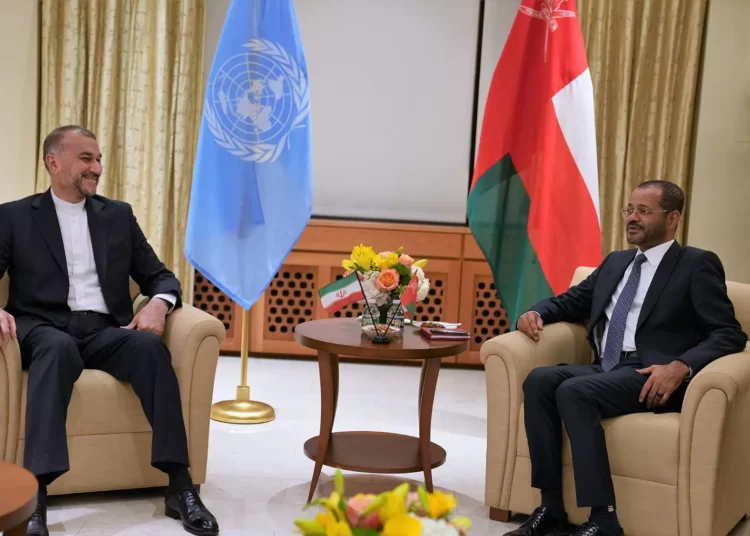In the immediate wake of Iran and the United States executing a prisoner swap, along with the subsequent release of Iranian frozen funds in South Korea, encouraging rhetoric concerning the nuclear negotiations and potential lifting of imposed sanctions has echoed from several officials. This emerging optimism has heightened speculation surrounding the impact the post-swap atmosphere can have on further issues.
Iran’s Foreign Minister, Hossein Amirabdollahian, addressed the development of the JCPOA discussions whilst conferring with the UN Secretary General, Antonio Guterres. He stated, “The exchange of messages with the United States persists, and the Sultan of Oman’s initiative is still on the table. Providing that all parties exhibit readiness, we remain committed to reinstating the JCPOA commitments, ensuring every party reconvenes their obligations under the JCPOA within the framework of the Oman initiative.”
Iran’s President, Ebrahim Raisi, overtly referenced this matter whilst in New York, notably during his oration at the United Nations General Assembly just after the prisoner swap. Raisi stated, “The onus is on the United States to foster an environment of trust and substantiate their earnest intentions whilst displaying authentic commitment to fulfilling their obligations and finalizing the course ahead.”
Upon the conclusion of his New York visit during a press conference, he articulated, “If the US is ready to meet its obligations, the ground will be set for advancing interactions and culminating in a good agreement.”
Alongside these indirect exchange of messages with the US, Iran has also had consultations with Europeans on this subject. Ali Bagheri, Iran’s chief negotiator, convened with the political directors from France, Germany, and Britain in New York to discuss a myriad of issues, including the talks pertaining to sanctions-lifting. These three European nations are members to the JCPOA.
Subsequently, Bagheri engaged with Enrique Mora, the European Union negotiator and coordinator involved in the talks on revival of the JCPOA. Matters germane to the JCPOA and lifting of sanctions were scrutinized, with Bagheri, the senior Iranian negotiator, confirming that these discussions will continue.
Simultaneously, discourse regarding nuclear negotiations wasn’t exclusive to Iranian officials; In a tweet on Saturday, September 23, Enrique Mora referred to his meetings with Ali Bagheri and Abram Paley, the US deputy special envoy for Iran, and wrote that the JCPOA was raised, as customary, on the sidelines of the UN General Assembly. Referring to the European policy, he concluded that there is no alternative to the JCPOA.
European Union’s foreign policy head, Josep Borrell, was among those who met with Iran’s foreign minister during his initial days in New York. In a segment of his tweet regarding his conference with the Iranian official, he accentuated the “need to find diplomatic solution to nuclear issue through JCPOA”.
Mohammed bin Abdulrahman, the Qatari Prime Minister and concurrently, the country’s Foreign Minister, commented on a meeting he had with the Iranian Foreign Minister in New York. He mentioned in his tweet that he had discussed the latest developments in the nuclear negotiations with his Iranian counterpart. It’s worth noting that Qatar, along with Oman, mediated the recent prisoner exchange between Iran and the United States effectively.
Mohammed al-Khulaifi, the Qatari Minister of States at the Foreign Ministry, engaged in a meeting with Ali Bagheri in New York on Tuesday, September 19. According to the official readout by the Qatari Ministry of Foreign Affairs, the discussions encompassed the ongoing efforts related to the talks on restoration of the JCPOA.
Badr al-Busaidi, the Foreign Minister of Oman, whose nation initiated the mediation between Iran and the United States pertaining to the prisoner exchange, conveyed in New York that the recent prisoner exchange between them will lead to more dialogue and closer relations in the coming months. This Omani official asserted, in regard to the nuclear agreement and the negotiations to bring all parties back into compliance with the JCPOA, that this is “best thing we have.”
Earlier, Reuters cited two sources and reported that Qatari officials conferred with their Iranian and American counterparts in New York, discussing measures to facilitate future talks with the aim of reaching a mutual “understanding” concerning the nuclear issue.
The ramifications of the aforementioned developments demonstrate that the prisoner exchange between Iran and the United States has fostered a conducive environment for the expansion of dialogues in other domains. Based on the indications and the remarks made by officials, these discussions are primarily geared toward addressing Iran’s nuclear issue and the lifting of sanctions. Notably, the common thread that intertwines the statements of Iranian, European, and regional officials is the overarching framework of the JCPOA.
Iran’s Foreign Minister has consistently underscored Tehran’s readiness to engage in talks predicated on the “September document,” referring to the draft that emerged from the Vienna talks in the summer of 2022. While American authorities have not explicitly endorsed such a framework, they have refrained from rejecting it in recent days, signifying a departure from past practices.
A recurring emphasis has been placed on the exchange of messages between Iran and the United States. This development suggests that in light of the noticeable shift in the policies of the three European countries toward Iran over the past year, the negotiations process, much like the original JCPOA negotiations, has thus far relied on indirect discussions between Iran and the United States. However, parallel consultations with European parties were conducted in New York. The extent to which Europeans will enhance their involvement in this process will hinge upon the quality of their interactions with Tehran.
The Biden administration has yet to make a firm decision regarding the revival of the JCPOA. An important question arises as to whether the American government will be capable of reaching a resolution on reinstating the JCPOA as the election season looms in the country. Some Western sources have employed the term “understanding,” which may serve as an avenue to bypass Congress and mitigate criticism from opponents within the United States. However, Iran has explicitly rejected any form of a temporary agreement.






